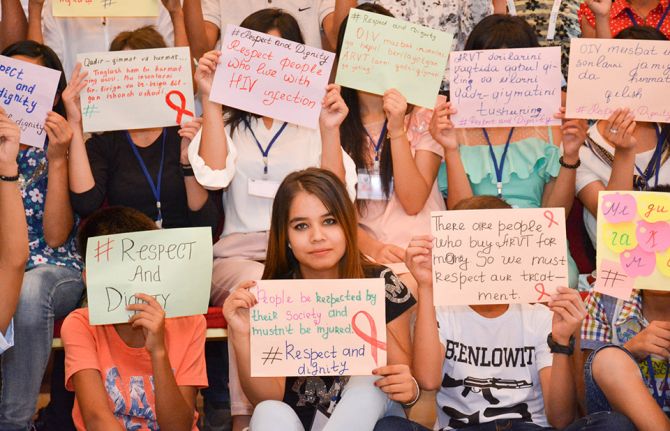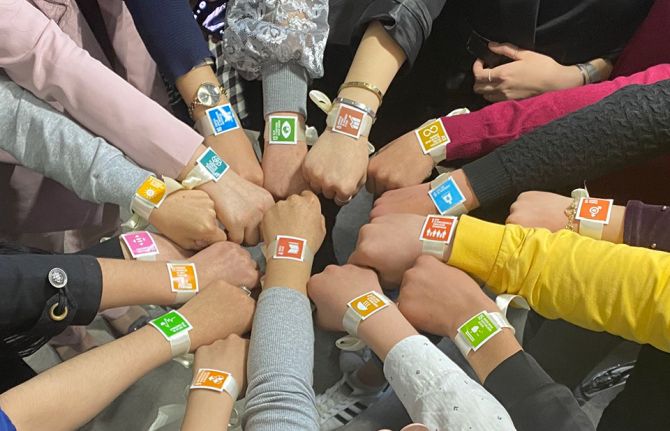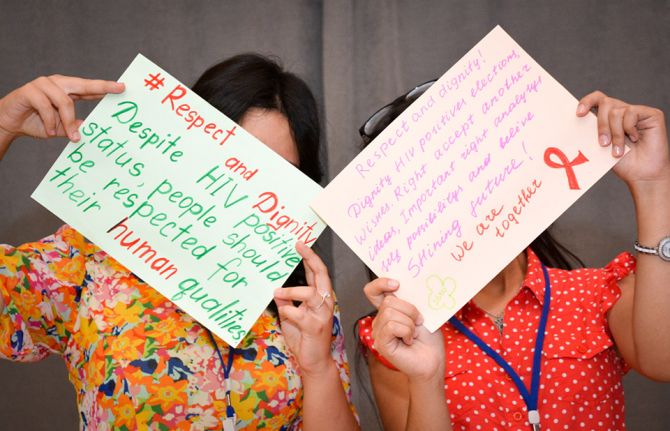



Feature Story
“I want to contribute to creating a world without stigma and discrimination”: young women living with HIV in Uzbekistan become activists
30 September 2020
30 September 2020 30 September 2020Lola Makhmudova (not her real name) grew up in a close-knit family, but her parents were afraid to tell her about her HIV-positive status for a long time, even though they both work in the health sector. She found out about it by chance, after hearing nurses talking in the hospital when she was 10 years old.
“Once, a few years later, when I already knew a lot about HIV infection and treatment, I was in the hospital with one boy, he also had HIV,” Ms Makhmudova said. “But his parents refused to give him antiretroviral therapy for religious reasons. I told them about myself, that therapy helps you to remain healthy, that I feel good and live a full life. I am happy that I managed to convince them. We are still friends with this boy.”
Ms Makhmudova is now 18 years old and has been a peer counsellor and volunteer at the Day Center for HIV Affected Families in Tashkent, Uzbekistan, for several years. She communicates with children and adolescents living with HIV, helps them to accept their diagnosis and explains the need for treatment.
Ms Makhmudova has not yet decided precisely what she will become when she is an adult, but she is sure that she wants to help people. She became one of three young people living with HIV to join the new United Nations Youth Advisory Board in Uzbekistan.
She takes her work on the Board for Youth Affairs seriously. “I was scared at first,” she said. “Everyone there is so grown up and smart. But I decided that I would study, I would learn languages so that I could be heard, and I could influence decisions that concern young people.”
The Board for Youth Affairs includes 15 young people from different regions in Uzbekistan, representing various social groups and interests, including the most disadvantaged and marginalized.
“Uzbekistan has agreed to be a fast-track country for implementing the Global United Nations Youth 2030 Strategy. The United Nations Board for Youth Affairs is part of the initiative. Currently, the board works with partners to ensure that the views of young people are taken into account in the development and implementation of United Nations strategies and programmes as well as the State Youth Policy in the country,” said Charos Maksudova, UNAIDS Country Manager for Uzbekistan.
Guzal Akhmedova (not her real name) is a young woman who has been living with HIV for eight years. She is a second-year student at the University of World Economy and Diplomacy and speaks Uzbek, English and Russian and is learning Chinese.
“I have been working as a peer educator for five years, and it is giving me a lot of opportunities. I’m a delegate of the International AIDS Society. In 2018, I was selected to go to the Netherlands to participate in the conference. And this year, I got a scholarship to take part in the virtual AIDS 2020 conference. My life and my story of living with HIV are unique because I love myself, my illness, my body and everything that I have. This all started when I accepted myself as I am. I suggest my simple motto to everyone: positive mind, positive life!”
Shirin Botirova (not her real name) found out that she was living with HIV five years ago, when she was 15 years old. Like many of her peers, she had to go through all the stages of accepting her HIV status. And this, according to her, was not easy. “After a while, I decided to start a new life without self-stigma. And from that day, my activism began. I started going to a self-help group, studying all the information about HIV.”
She also began studying law to know her rights and how to protect people living with HIV.
Since 2015 Ms Botirova has been actively participating in various trainings for peer counsellors.
“Today, I am a national trainer, and I try to share the knowledge and skills that I have. We conduct training throughout the country, and even in other countries, talk about peer self-help groups and consultations, give general concepts about HIV.”
Ms Botirova is doing everything to ensure that the world accepts people living with HIV without stigma. “I want to contribute to creating a world without stigma and discrimination. I set myself the goal of changing the attitude of people towards us, people who are living with HIV, since this is one of the most urgent tasks in our region. I believe that everything depends on ourselves, and I believe that together we can create a world without borders.”


